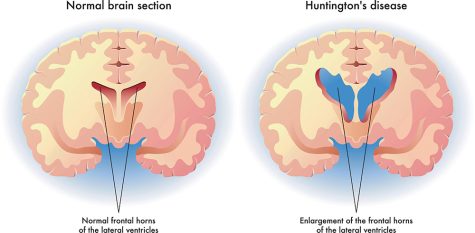
Megan Lander | Student Life Editor
October 10, 2025
A group of revolutionary scientists from the research team at University College London (UCL) and the National Hospital for Neurology and Neurosurgery have successfully found a treatment for the infamous Huntington’s disease for the first time, offering a new sense of hope for patients and families who are affected. With help and collaboration from another team and with a biotech company called uniQure, this discovery was announced in early October 2025. The treatment utilized gene therapy in order to stall the progression of the disease by 75%. The process takes place through an intricate brain surgery. The procedure is now considered a major milestone in the world of genetic medicine as it is developed to inhibit a toxic protein that is fatal to brain cells in Huntington’s patients.
Key details about Huntington’s disease are that it is rare and actually an inherited disorder caused by a mutation in the huntingtin gene. Neurons are destroyed in the brain by the faulty gene due to a toxic variation of the huntingtin protein that is made, slowly killing cells. Some symptoms included with the disease are combinations of dementia, Parkinson’s disease, and a motor neurone disease. Senior Ellie Martin said that “it is devastating to watch someone you love so much slowly deteriorate in front of you. Suddenly they forget who you are and that is something [you’ll] never forget.” People will tend to notice signs of this condition in a person’s 30s or 40s, but in a matter of only 20 years later, it will be fatal. The gene has a 50% of being passed down to a child if one of their parents carry the gene of the disease.

Around the world, approximately 75,000 people are currently living with Huntington’s disease in parts of the UK, US, and Europe. It is almost certain that there is a much larger number of people who have the genes but are not symptomatic yet and don’t know.
This newly developed treatment calls for a dose of gene therapy into the brain while the patient endures 12-18 hours of surgery. The altered virus is then inserted into the brain cells introducing a new sequence of DNA that will convert the cells into mini factories to then produce fragments of the generic material called microRNA. These fragments stop the signals that make the harmful huntingtin protein, reducing levels of the disease and preserving brain cells.
The trial took place over the span of three years and involved 29 patients. With this treatment, the development of the disease slowed down by 75%, which is very impressive. The patients who saw the rest of their lives held captive to a wheelchair can now walk with the care they received. Senior James Simons felt that “the research done for this project was phenomenal and will inspire further research for other diseases that need cures.”
The extensive research these teams have done in their contributions to this disease have given families hope. Sarah Tabrizi, a professor at UCL, called the outcome “spectacular” and believes this is only the beginning of a long journey of medical discovery. Today, the trials continue and include testing on people who have the gene but have no symptoms yet to prevent the entirety of the disease.

Leave a Reply